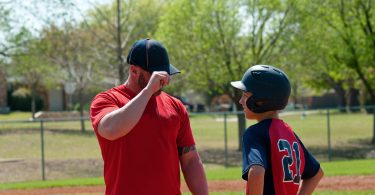If you haven’t noticed already, we are big on academics and so are the college coaches who will be recruiting you. College coaches prefer to keep their focus on the field and winning games. The last thing a coach wants is a player who is getting into trouble in the classroom or who will become an eligibility or APR (Academic Progress Rate) risk. Academic issues can lead to penalties on the baseball program from the university, cause scholarship reduction penalties from the NCAA, and even cost a coach his job. On the flip side, a player with great academics becomes an easy sell for a coach if he likes what he sees on the field. Academic scholarships can be even more lucrative than baseball scholarships, so a player with good grades not only reaps the benefits himself but can also save the coach some scholarship money. Here’s the bottom line when it comes to academics and college baseball—if you are serious about playing college baseball, you need to get serious about your academic success. Luckily, we have 12 articles that can help you better understand why your academics are so important and help get you on the right track. Just click on the article titles below!
Making the Grades
One of our foundational articles, this article provides a nice overview of everything we discuss at length in the articles linked below. Read about why it’s important to consider academics as a critical part of your plan for making it to the next level!
College Coaches Survey Results: Academics are Very Important
We asked college coaches from every level of college baseball from NAIA and JUCO to D1 how important it is for a recruit to be a good student. Their answers should help give you the motivation to hit the books and study for your standardized tests like you would prepare for a championship game.
What College Players Say About Balancing Baseball and School
There’s a reason why college coaches place such an emphasis on recruiting players who show that they can handle the responsibilities of balancing baseball and school in high school—it doesn’t get any easier in college! Don’t wait until college to take the advice from these successful college ballplayers, start applying them to your study habits now!
Three Good Reasons Why You Need Good Grades
Need a reason for putting in the time and effort to do well in school? These three should convince you!
Eligibility 101
The mother of all eligibility resources on the KPB site, this article will help you ensure that you take the right courses to stay on track to play college baseball and links to the most important sources of information on NCAA eligibility.
College Baseball Academics Mini-Series
In this 4-part series, we discuss the academic support services available to college baseball players, the questions to ask during recruitment to find a program that will have the academic support you need, in addition to resources specifically for recruits with learning disabilities or other education-impacting disabilities. The link above will take you to the first article of the series but we suggest you read them all!
KPB Podcast Episode 29 with Christine Ho, Learning Specialist Coordinator at UC Berkeley
If you are wondering what academic questions you should ask in recruitment and how to know if programs you are considering have the academic resources for you to be a successful student-athlete, this podcast episode is a must! Ms. Ho has 7 years of working directly in support services for student-athletes at one of the nation’s top schools and she shares great insight and advice!
Get Organized, Get the Grades
Organization and planning are a huge part of academic success. This article will help you get organized so that getting the grades you want is much easier.
Better Grades Mean More College Baseball Opportunities
Good grades and test scores will open up many college baseball opportunities and poor grades and test scores will quickly limit your options. This article discusses the importance of keeping doors open and increasing your chances of playing at the next level through academic success.
5 Ways to Improve Your Grades Even if You Hate Studying
Studying, like hitting a baseball, takes practice. Much like certain aspects of being a ballplayer, studying comes more naturally to some people than others. But that doesn’t mean if you don’t like studying or it doesn’t come naturally that you can’t put the work in to become great at it! Even if you fall into the category of student-athletes who dislike school and have a hard time sitting down to study, we think these 5 tips can help you improve your study habits and academic success!
Using the Off-Season to Get Better Grades
We often say that championships are won in the off-season. The same can be said about academic success. It’s important that you use your time away from baseball to focus on academic success, build good study habits, come up with an academic plan, and set the academic tone for the spring season. Click the link to find out why this is so important for aspiring college players.
What You Need to Know About JUCO Baseball: Academics
Junior College baseball has the most laid back academic eligibility requirements, but that doesn’t mean if you are planning to go the JUCO route that you should put any less effort towards academic success in high school. This article explains why being an NCAA qualifier, even if you play JUCO ball, is important.
The SAT and ACT: What You Need to Know
As a serious college baseball recruit, you should know just how important your test scores are for playing at the next level. In addition to keeping your options open, there is a lot of scholarship money to be gained by doing well on your SAT or ACT. Don’t just show up to the test, prepare for it the same way you would a big game and have a plan that will allow you to re-study and take it again if things don’t go as well as you would like the first time around.
You Already Know How to Dominate the SAT or ACT
It may seem like a tall task to take on the big standardized tests, but you are a lot more prepared to dominate than you think. We explain how in this article!







